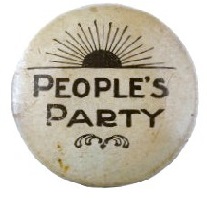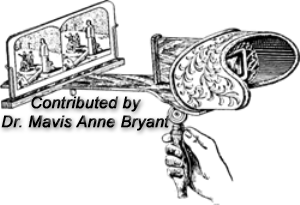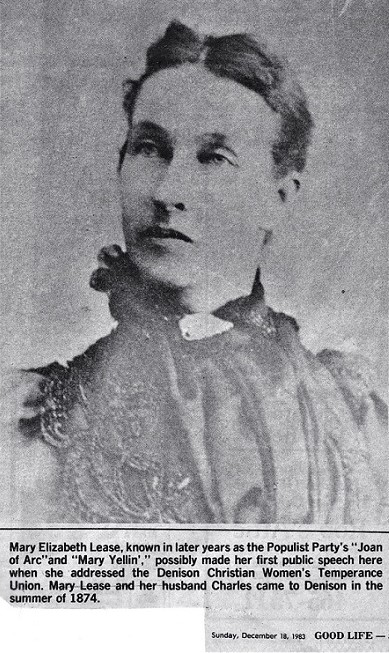|
Mary Elizabeth Lease 
Herald Democrat Denison Women's Christian Temperance Union  Kansas Memory Courtesy of the Kansas Historical Society "Lectures" "Opinions of the Press"  Mary told her story which made such an impression on the New York Review of Books that it called her "the Joan of Arc of the farmers and working men in Kansas." The Sunday Gazetteer
Sunday, June 16, 1895 pg. 3 HAS OCCULT POWERS Mrs. Lease of Kansas a Telepathic and Hypnotist. How She Hypnotized a Republican - Reads Unseen Letters. Mary E . Lease, of Kansas, is possessed of the power of hypnotism to an unusual degree. To a correspondent she spoke freely of her accomplishments along these lines. She said: "Nothing is impossible in this day and age. The process of evolution has progressed as far as it can, and the developments of science are a demonstration to us that our eyes cannot see as well as a camera. We have for years been able to convey messages to great distances by telephone and there is no reason why we should not convey them with equal accuracy by thought. I have frequently sent thought messages to San Francisco and received accurate answers to them. For many years I have known that I possessed a large amount of electricity. The same words addressed to an audience, with the same gestures and the same intonation of voice, will not have any effect if not coupled with magnetism. It is this power of magnetism, hypnotism or mesmerism, or whatever you may please to call it, that gives the wonderful influence possessed by evangelists. "I refrained from making public my powers because I do not think it a subject which should be spoken of indiscriminately. I have often exercised my hypnotic powers on individuals in my audiences. Once, while speaking to a republican audience, made up largely of old soldiers, at Mount Pleasant, Iowa, in the campaign of 1892, I saw a crippled veteran standing up in the crowded hall and invited him to step forward and take a seat on the table at my side. He replied that he guessed he could hear all that he wanted to of my speech while standing, but he kept edging toward where I was talking and finally seated himself on the corner of the table, as I had invited him to do. As I walked by him in addressing the audience I occasionally caught his eye, and when making gestures would make a pass before his face. Soon I had the satisfaction of seeing t hat I had him completely under my control. When I had nearly concluded my speech, I said I would call upon him to testify as to the truth of all the statements I had made. He responded promptly and made a most eloquent speech in support of the position I had taken. He was one of the most rabid republicans in Iowa, and his friends were more than surprised at the flights of oratory he indulged in, as well as at the radical change that he had undergone in his political beliefs. He was no doubt more surprised than his friends. "I once had rather an interesting experience at a reception tendered me by my sister, Mrs. E.C. Timmins at her home in Englewood, Chicago. For the entertainment of the guests I proposed to read accurately any letter that might be given by simply placing it between the palms of my hands. A gentleman handed me a letter, and I not only read it to him, but told the name of the writer and gave a description of him without opening the envelope. At a meeting of Occult club in Detroit I gave a similar exhibition and read 23 letters in the same way without an error. "I do this by intuition, which, by the way, is a power that is much more highly developed in woman than in man. "Without any spirit of egotism I wish to say that I possess powers that will astonish the world. Without any religious cant or professing to control any force that it is not possible for any man or woman to acquire, I assert that I can do anything I want. I think that the day is not far distant when men will accomplish with ease any or all the miracles performed by Christ. They will literally turn water into wine and walk upon the sea with the ease that they now move over the land. "In all my work upon the rostrum I adopt the ethics of Christ. I do it sincerely and find its effects are wonderful. If one does not think evil, he can do no evil, and his powers are greatly increased in every direction. The ordinary faculties of mankind must give way to the new development which is rising above the common senses, and the true man will take the place intended for him by the Creator." - - - San Francisco Examiner Soon after 1896 Mary divorced Charles and moved to New York City with her four children, where she worked as a lawyer and lecturer. In 1905 Mary's son, Charlie, became quite ill, eventually dying and being buried in an unknown place in Denison, Texas. The Wichita Daily Eagle Wichita, Kansas Sunday, 1 October 1905 pg. 8 Gusts of City News D.E. Fuller received a letter from Amos McClain, who is enjoying the sights in New York City. He says Charlie Lease is very sick having passed through three operations for appendicitis, but there is some hope for his recovery. He would bring him back if he could stand the journey. About three months later, the death of Charlie Lease was announced in the Denison Sunday Gazetteer. The Sunday Gazetteer
Sunday, December 24, 1905 Dr. Acheson received the intelligence of the death of Charley Lease, who died at New York City of appendicitis. The deceased is the son of the celebrated Mrs. Lease formerly of this city. He was 30 years of age and will be buried in Denison. She spoke on behalf of Eugene Debs when he ran for president in 1908, then became an admirer of Theodore Roosevelt and supported his bid to recapture the presidency under the banner of the "Bull Moose" Progressive Party. Before she died in 1933 she saw the passage of many of her goals - prohibition and women suffrage as well as much of the Populist platform.  BIOGRAPHY INDEX  Susan Hawkins © 2024 If you find any of Grayson CountyTXGenWeb links inoperable, please send me a message. |

